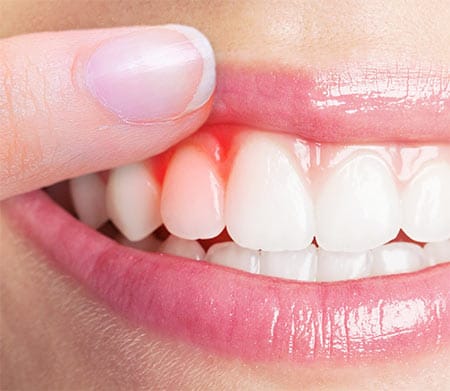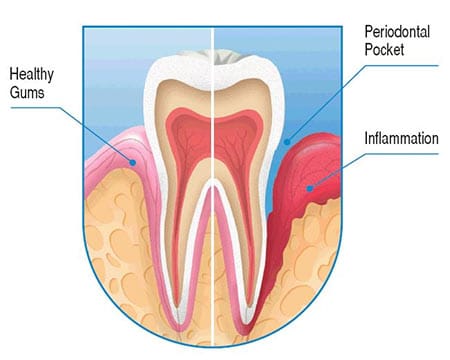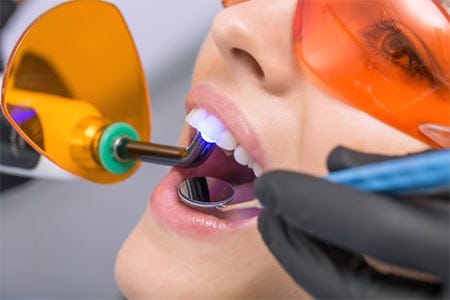What Is Periodontal Disease?
Periodontal disease, which affects your gums initially, may be more familiar to you than gum disease. It is caused by mouth bacteria, which are naturally present in the oral cavity. You probably have several hundred bacteria strains cohabiting in your mouth at any given time. Most will not cause any problems, but some are more destructive, especially if allowed to thrive and multiply freely.
When these bacteria spread, they gradually infect and inflame your gum tissue. The infection and inflammation worsen with time, destroying your gums.
Severe periodontal disease can also destroy other structures around your teeth, such as the bony socket in which your tooth is positioned and what are called periodontal ligaments. These are stretchy pieces of tissue that are attached to your tooth and the socket, supporting the tooth.
How Do You Get Periodontal Disease?
Your risk of developing periodontal disease is significantly higher if:
- You consistently avoid brushing your teeth and neglect to floss.
- You experince hormonal changes due to puberty, menstruation, pregnancy, and menopause.
- You have a family history of gum disease.
- You have cancer, diabetes, or HIV which can all weaken your immune system, making your body less capable of fighting infections.
- You’re taking prescription and over-the-counter medications that induce dry mouth.
Gingivitis is the early stage of periodontal disease in which your gums become swollen, irritated, inflamed, and, in some cases, recede. Ideally, the condition is diagnosed at this stage, which is typically the case if you visit your local dentist or Dr. Umanoff on a regular basis for thorough exams, checkups, and cleanings.
The benefit of diagnosing gingivitis early is that it is usually quite simple to treat and the effects are entirely reversible. It’s a different story if you don’t notice these signs and don’t see your dentist regularly.
What Does Gum Disease Look Like?

Gingivitis can worsen without treatment, and you will eventually develop advanced periodontal disease. The signs are far more apparent at this stage, as your gums begin to recede as a result of the deterioration, and pull away from your teeth, creating deep pockets filled with bacteria.
These deep pockets, known as periodontal pockets, are nearly impossible to keep clean with a regular toothbrush. Hence, the condition progresses over time. Your periodontal ligaments and bone around your teeth will eventually be destroyed, causing teeth to become loose and fall out or require extraction.
What Are Periodontal Pockets?
 Periodontal pockets are areas or gaps that form around the teeth when the gums are no longer properly attached to them. As these pockets emerge, they provide an ideal environment for bacteria to thrive, allowing the infection to spread to other tissues that help keep your teeth firmly anchored in your mouth, such as periodontal ligaments and bone surrounding your teeth.Periodontal pockets may seem to be invisible at first, but your gum disease dentist Dr. Umanoff, as well as your local periodontist or general dentist, can readily detect them during a dental examination.
Periodontal pockets are areas or gaps that form around the teeth when the gums are no longer properly attached to them. As these pockets emerge, they provide an ideal environment for bacteria to thrive, allowing the infection to spread to other tissues that help keep your teeth firmly anchored in your mouth, such as periodontal ligaments and bone surrounding your teeth.Periodontal pockets may seem to be invisible at first, but your gum disease dentist Dr. Umanoff, as well as your local periodontist or general dentist, can readily detect them during a dental examination.
What Are the Treatments for Mild and Moderate Periodontal Disease?
Periodontal treatments depend on the type of gum disease and its severity. If gum disease is caught early and no damage to the supporting structures has occurred, you may only require professional cleaning from one of our hygienists. Other times, it might be more serious, requiring ongoing treatment.
If you have gingivitis, your dentist will clean your teeth thoroughly, eliminating any plaque and tartar buildup and removing the bacteria that are causing the infection and inflammation. However, that is not the end of the treatment; you will almost certainly need to improve your home oral care routine.
Your dentist or hygienist will educate you on how to brush more thoroughly, including which toothpaste to use and whether an antimicrobial mouthwash will help get rid of more bacteria. You should also floss every day, and if you have trouble flossing, tell your dentist so that they can help you.
There are several different tools available these days that make flossing easier and more effective. You must establish a routine that you can follow for the rest of your life. As you start to brush and floss more thoroughly, you’ll notice your gums become healthier and stronger, and they should stop bleeding completely within a few weeks.
Advanced Periodontal Disease Treatment
 Treatment for advanced periodontal disease is entirely different, and you should consult a specialist dentist at LuxDen or your local periodontist. Dr. Umanoff has years of advanced training in treating gum and other structures around the teeth and can provide you with the best and most up-to-date treatments.
Treatment for advanced periodontal disease is entirely different, and you should consult a specialist dentist at LuxDen or your local periodontist. Dr. Umanoff has years of advanced training in treating gum and other structures around the teeth and can provide you with the best and most up-to-date treatments.
The goal is to eliminate as many bacteria as possible, which is generally accomplished by the use of laser dentistry, which sterilizes the areas of gum that are treated. Make friends with Dr. Umanoff and the dental team because you will most likely need to see them on a regular basis for ongoing care. If it saves your teeth and your smile, it’s well worth it.
More severe periodontitis is usually treated with scaling and root planing, a procedure that removes plaque and tartar buildup from the tooth root surfaces exposed by deep periodontal pockets. This technique is usually used in conjunction with laser therapy.
Using a dental laser helps eliminate even more bacteria deep in periodontal pockets since the laser’s energy effectively sterilizes the pockets. In addition, if any tissue is too badly damaged to heal properly, a dental laser can more efficiently remove it. Because a dental laser is so accurate, only diseased tissue is removed, and the laser’s beam automatically seals any tiny blood vessels, decreasing infection risk and healing time. As your gums heal, they should begin to fit more snugly around your teeth.
